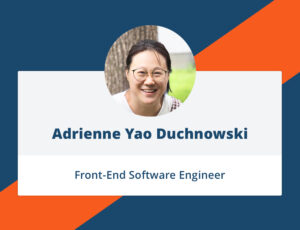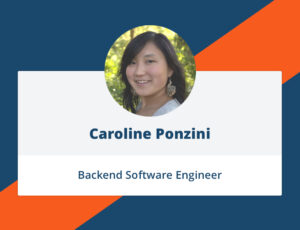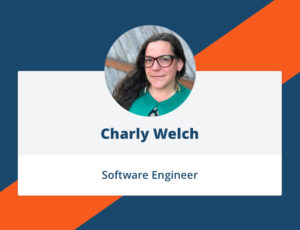3 Women in Tech Who Will Inspire You

More than ever before, women have made an impact in the workforce. According to Career Karma, 57% of jobs in the US are held by women but only make up 25% of the tech workforce. That’s only one in four people!
So, what’s it like to be a woman in tech? We chatted with three women with different roles in tech and different stages of their careers about what motivated them to attend a bootcamp, what it’s like being a woman and a mother in the tech world, and how their lives have changed since graduating.
As the saying goes, “Mom knows best.” Is there any valuable piece of advice that your Mom taught you or passed down that has helped you on your journey?
I personally am not very good at taking direct advice. Like now I am, and I think I’m more open to it, but growing up, definitely everything my mom told me I was like…no.
I mean, all the things that she’s said to me are still in my head, but none of them was something that I followed. I think my mom was really good at showing me through her actions. She’s definitely just thinking about how she was and when I was growing up. I’ve definitely seen her persevere working with limited resources and just like making things work.
And then I think most importantly, probably just speaking up for herself when she needs to, I think that’s so important because if you don’t speak for yourself, nobody else will know what’s going on. Not that people don’t want to, but they don’t know what’s going on with you. So I think using your voice and putting yourself out there and saying the thing that you need to say. I’ve seen her do that, so I think that was just something that, you know, she passed on.
Balance can be difficult to achieve and sometimes even a myth for working mothers. Whether you reach it or not, what tips would you give to a mother just starting in a bootcamp?
Well, for me, it’s different because I took the self-paced program, so I knew I wasn’t under time pressure. But I think it’s just important to not be intimidated to know that this is like. As long as you put in the time, and go through the exercises, and really just be interested in what you’re doing, and figure out ways to apply it to your own life.
I think going for a bootcamp, it’s an emotional journey. We’re not robots, we don’t sit there, and we can’t just process all of this.
Make sure you check in with yourself, take a break, go hug your kid, go hug your husband or family or whoever. Take a break and walk away from it for a little bit if it gets frustrating, and then come back to it when you’re in a better mind space. That always helps.
So far, everything I’ve encountered in the bootcamp, if I just walk away, and I come back, it always works out. I haven’t finished a bootcamp, I still have one project. So hopefully, that’ll still work for me. Just remember to take breaks.
How has your life changed since attending your bootcamp?
Oh, my gosh, my life really changed. It was really great because the Flatiron program actually allowed me to take a break. So many personal things were happening at the time and I was able to take a break from it and pause without it impacting me.
I just basically was on pause, and I could come back to it whenever I was ready. I became a mom, so obviously, I needed to focus on that. The program itself was very accommodating to everything that was going on, especially becoming a new mom and getting through the newborn phase. And COVID happened, as well, so as much as I wanted outside help, I was a little hesitant about it.
There was always help when I needed it. Because of all the things that are going on in my life. I mean, sure there’s the Slack channel, but I think slack can be a little bit overwhelming for somebody who has to take care of a kid. That part of it wasn’t really helpful, but I can still go on the Slack channel whenever I have free time and maybe search for things that have already been discussed – that history is there. If I can’t necessarily keep up with it in real-time, all those things are all there and I felt supported the whole way. Hopefully, as I have more and more time, you know, I’ll be able to wrap up the program and figure out what’s next.
As the saying goes, “Mom knows best.” Is there any valuable piece of advice that your Mom taught you, or passed down, that has helped you on your journey?
Don’t make important decisions at night.
I remember when I was probably a teenager, like a younger teenager, I always got really upset about stuff. At night, I would be so mad that this thing or this injustice happened. I was upset that people behaved like teenagers, and she would just say, “sleep on it — you’ll probably feel differently about it in the morning.”
I was like, “You don’t know what you’re talking about. My feelings are real.” And then wake up in the morning and I was like, “that was not that big of a deal.”
What I’ve realized is that it transfers to adult life and especially like work life in terms of spending too much time focusing on a problem or something you’re trying to get done. You get stuck just banging your head against the wall instead of walking away, taking a break and saying, “You know what, I can work on something else or take a break and come back to this in the morning.”
That, for me, is usually a much more productive approach. I’ll come back and look at it the next day and be like, “I know the answer, or I figure out a couple different things.”
Balance can be difficult to achieve and sometimes even a myth for working mothers. Whether you reach it or not, what tips would you give to a mother just starting in a bootcamp?
You have to be okay with temporarily being less available for your family than you would like for them. Women who are working mothers are challenged by this double standard that says, “Well, traditionally you’re supposed to be in charge of all the house things.” Well, my peers might say, “We don’t expect that of you.” But the structure of society expects that from me.
So, on the one hand, there are these unspoken expectations and on the other hand, at the same time, I think women are raised now with this idea that you can have a career and be really successful. You can pursue intellectual or creative goals and have this full life. However, you don’t have 48 hours in every day, and there’s not two of you, so you can’t do everything at once, which is a hurdle that we all face in various ways.
It’s difficult to reconcile the expectation that mothers are supposed to behave a certain way with pursuing their career through any sort of rigorous education. It could be law school or if you’re doing an executive MBA graduate program. It requires so much of your time that you start to feel guilty about not being there.
Going to a boot camp, it’s just something that’s good to keep in mind. If you’re feeling like, “I’m not being a good mom, I’m not there enough for my children.” Remember, the bootcamp is temporary.
It really is like such an intensive learning experience. It doesn’t represent what it’s like to be a software engineer. Like, I am not working 12-hour days and I’m sure some people do, and that’s their choice, but that’s not how things are on my team where I work. It’s important to be okay with that and acknowledge that there are some double standards out there, but at the same time, think about the outcome that you’re looking for and the example that you’re studying for your children.
If you look past that six months, or however long the program is, to two years from now or three years from now, it’s somebody that worked really hard and hopefully has a very successful career and is really contributing to the work that they do or their team or their organization in a way that they feel is successful.
Expect that you’ll have less time with your family but remind yourself that it’s temporary and it’s not your responsibility to meet everybody else’s expectations. While you’re in the camp, it’s okay to adjust what you are expecting of yourself and rebalance your load at home. Lean on other people for help — it’s always okay to do that and to do something for yourself.
How has your life changed since attending your bootcamp?
Well, that’s a good question. I don’t have that thing that used to happen on Sunday nights where I’d be like, “Oh no, I have to go to work tomorrow.” I don’t think about that. Sometimes, I admit that I do this, but sometimes I will work for a couple of hours on the weekends because there is something that I’m curious about or because I will think of a solution to a problem that I’ve been stuck on. I want to be clear that it’s not because it’s expected of me, but because I am interested and curious about what I’m doing, which is different.
I’ve always thought of work as a thing you do because you have to do it and now it’s a thing that I do because I have to do it, but I’m also interested in doing it. I would probably still do it if I didn’t have to work to be financially independent. Probably not as many hours, but it’s something that I’d still be interested in and still be curious about and still want to learn more. And that, I think, is big.
The difference for me is with technology is there is always something new to learn, which wasn’t always the case when I was practicing law. So, yeah, that’s a big change for me.
As the saying goes, “Mom knows best.” Is there any valuable piece of advice that your Mom taught you, or passed down, that has helped you on your journey?
My mom is also queer, so I was raised by a queer, single mom who was working class and in school — my mom is not the norm. Any idea you have of like a typical mom, toss it out the window, because that is not mine.
The way I grew up was very much, “we used what we had.” We dealt a lot with food scarcity, utilities being shut off, and me being completely alone all of the time. This thing about her that I’m about to slather appreciation all over is also a reason that I’m very stressed out all of the time. I jump to intense stress because my mom is kind of just like, you know, this tough thing is happening, and we’re going to get through it. We can be miserable about it, or we can have a good time and that has served me so well. If the car breaks down on the side of the road, we’re going to get some help, and we’re going to figure it out. Again, I can’t say things like that without naming the level of privilege that I hold. I know that I could break down in the middle of nowhere and be real sweet to whoever shows up and they will help me. That is not true for most people. So that’s the thing and I share with my son — we have an abundance of resources.
We have everything we need and more. In the past, we’ve had many tough times where we didn’t have the resources we needed, it wasn’t comfortable, or something always went wrong. Now, here we are in COVID, and my child is completely isolated from all other children. He hasn’t been in person with another kid in months, and it’s hard. So, we take dives into big feelings of sadness, loss, and grief. We are there for a little while, and then we get to choose together to move into something else. We can acknowledge the thing — this totally sucks — and now, we choose to be together and have quality time and focus on the things that are good and bring us joy. I would be a very different person without that tool.
Balance can be difficult to achieve and sometimes even a myth for working mothers. Whether you reach it or not, what tips would you give to a mother just starting in a bootcamp?
I don’t think I reach it. I cannot stress enough the importance of having community to support you through a bootcamp. It is immersive and you are not going to be able to spend the time that you want to with your children. They will have needs that you are not going to meet while you’re in a bootcamp.
Whether you’re partnered or not, having people who can step up, having other parents, I would recommend reaching out to your closest people and say, “I’m starting this and need some support. Can you support me? These are the things I need for support.” Sit down and put some actual thought into what that might look like.
I was fortunate to be living with very supportive friends. I would drop my son off at school at 7:30, 15 minutes before he could go in for breakfast and I would get home around 7:45 at night. I’d have 15 minutes with him before it was bedtime. That sucked. I would do things like take one of his stuffed animals with me throughout the day and take pictures of it everywhere I went and try to connect with him in those ways. But it was tough. I spent a lot of time crying and that’s okay. It was tough and quick making a change like this — any change — is painful in some ways, right? Even when it’s positive. This is a big one. Big and fast and expensive and scary. And like, what is even going to happen on the other end of this thing that I’m putting all of my resources into?
You need support. Intentional support. Don’t just count on the people to show up — have a conversation about it. The other thing I would say is make sure you can make at least 15 minutes to just put all of the screens away and focus on your child or children. I missed that a lot. Many days, I get to the end of the day and I’m like, “Wow, I didn’t even make eye contact with my kid today.” The days where I do connect with him are different from the days that I don’t, in terms of our relationship. That’s the best advice I have for that question.
How has your life changed since attending your bootcamp?
I went from a situation where I was recently separated, super depressed, anxious, suicidal, living in poverty to getting a job six weeks out of bootcamp. I don’t want to make it all about money, but really the decision to go was about that and having resources. In just a little over two years into the field, I bought a house. I have resources to contribute to mutual aid efforts. I have space and time for recreation. I go kayaking a lot. I just have resources, which has not been my experience at any other part of my life. I make close to five times as much money as I made years before, and I work probably about a third as hard and fewer hours.
It’s granted me access to relaxation, and all kinds of other things. I have time to learn things, things I’m interested in that aren’t about work. I have time to connect with my kid, the ability to send him to camp if I want to. There’s so much privilege too though. I’m a highly educated white cis woman, so the access is just compounded and compounded and compounded. So, it has changed my life, utterly and completely.
That’s why I always sign up to do things like this pretty much whenever they come across because it helped me so much and anything I can do to help other people get into bootcamps. My school – I was in a Code Lab – has really great scholarships and partnerships with nonprofit organizations for POC and WOC. It’s my goal to pull people up as much as I possibly can.
A quick story: I remember so clearly the first time my car broke down after I had gotten that first tech job. I was able to get it fixed but didn’t have the cash for it. I had a credit card with money on it that I could use. I could take the morning off work to take it into the shop and get it and work from home during — I was able to fix it. Whereas other times in my life, and for most of my family origin, a broken-down car could destroy everything easily. You can’t get to your job, you can’t get to your kids, it could just make your entire life fall apart. And for me, it was an inconvenience of two days.
More recently, I got an infection. I was able to call a nurse advice line and have a video call on a Sunday afternoon with him. I picked up medicine two hours later. In between those two hours, I spiked a fever and things got bad fast. I just thought, if I hadn’t been able to do all of that, if I didn’t have the access, this infection would have been so bad. I would have been trying to get myself to urgent care in a pandemic. I don’t think that you realize when you’re living in deep poverty — you know it’s stressful — but letting go of that, and moving out of that, the chemistry in your body changes, releasing that much stress. There are no words for it, and if I can help anybody feel any level of that, let’s do it.
Looking for the right coding bootcamp to start your tech career? We’ll help you find a school that can help you meet your goals.





